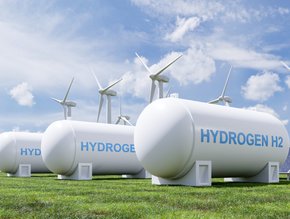Lifetime of Achievement: Sam Laidlaw

Plenty of companies are taking an abundance of measures to ensure they are being more conscious and kinder to the planet. But one company, and its CEO, come up head and shoulders above the rest.
Cue Sam Laidlaw, Founder and Executive Chairman of Neptune Energy. Since it was established in 2015, Neptune Energy has worked its way up to take what is now a leading position in gas with material improvements on greenhouse gas reduction under Laidlaw’s leadership. Its stance when it comes to environmental responsibility is solidified by its joining of the Oil and Gas Climate Initiative’s (OGCI) Aiming for Zero Methane Emissions Initiative and its own target for zero methane emissions by 2030. OGCI’s initiative, with supporters such as bp, Shell and QatarEnergy and supporters among the likes of Accenture, SLB and Society of Petroleum Engineers (SPE), establishes an all-in approach that treats methane emissions as seriously as the industry already treats key issues like safety.
Neptune Energy is also noted as one of the UK’s lowest carbon producers in their operations, with their transition objectives also complemented by exceptionally strong financial performance.
Sam Laidlaw: An extensive energy career
The son of the late Sir Christophor Laidlaw, a manager at bp who rose through the ranks to be Deputy Chairman before becoming Chairman of computer maker ICL, Laidlaw’s early career kickstarted with his stint at Eton followed by reading Law at Gonville and Caius College, Cambridge, gaining an MA in 1977. Two years later, he qualified as a solicitor and then obtained an MBA another two years later from the INSEAD Business School in Fontainebleau, France.
Starting his foray in the energy sector at US oil company Amerada Hess in that same year, 1981, Laidlaw played an integral part in building the business’ North Sea arm, then holding other executive roles such as President and COO from 1995 until his resignation in 2001.
“Sam Laidlaw has made many valuable contributions to the growth and success of Amerada Hess Corporation over the course of his twenty year career with the company,” said John B. Hess, Chairman and Chief Executive Officer at the time.
Among his other career highlights are EVP of Global Business Development at Chevron and CEO of Enterprise Oil, the latter of which was bought under his leadership by Shell in 2002. Laidlaw then took a dip away from the energy sector through leadership roles at HSBC, the UK Government’s Department for Transport and Hanson, now Heidelberg Materials.
Laidlaw’s steering voice in the energy sector was not missed for long, however. He has had influence industry-wide as Chairman of the Petroleum Science and Technology Institute, Director of the National Engineering Laboratory and President of the United Kingdom Offshore Operators Association — all indications to his exemplary contribution to the industry and efforts to ensure its bright, green future.
Continuing his impact, Laidlaw joined Centrica as Chairman of the Executive Committee and the Disclosure Committee in 2006, a role he held until founding independent international oil and gas exploration and production company Neptune in 2015, which launched three years later.
Neptune: Learning from the past to shape the future
Seeking to identify large-scale investment opportunities, Neptune has a regional focus on the North Sea, North Africa and Asia Pacific and delivers energy where and when it is needed while simultaneously centred on achieving sustainable growth by optimising operational efficiency, increasing productive capacity and growing its international presence.
Speaking to the Standard, Laidlaw expresses his optimism for the future, and how energy must be respected and nurtured for it to be harnessed to its full potential. He shared how Neptune, like many others, must adapt to deal with environmental pressures and customer demand.
“Although we have seen a welcome growth in renewables over the past decade, the UK is still reliant on gas and oil to keep us warm, keep the lights on and keep people moving,” he declares. “Low carbon developments will need to use existing infrastructure – from depleted gas reservoirs to transportation networks and storage facilities. The North Sea has these in abundance and energy companies, including Neptune, have already submitted plans to the Government to repurpose facilities previously used for oil and gas to speed the transition to hydrogen and carbon storage.”
A firm believer in learning lessons from the past in a bid to shape the future, there’s no doubt that Laidlaw’s influence will continue to be felt under his leadership at Neptune, whatever his next role may be and way into the future.
Last year Neptune announced it was being bought by Italian energy firm ENI for US$4.9 billion, on which Laidlaw said: “This transaction offers a new and exciting phase for Neptune, with significant growth opportunities supporting energy security and the energy transition.” The announcement marks the largest cash deal in the European oil & gas sector in recent years, faith in Laidlaw’s leadership and the direction Neptune is not only taking business-wise but regarding its environmental commitments.
Outside of Neptune, and a testament to his dedication to the energy sector, Laidlaw has advocated for the role of the UK North Sea in providing domestic gas supply and achieving energy independence by 2040.He is also a Non-Executive Director of Rio Tinto and Chairman of the National Centre for Universities and Business (NCUB), leveraging upcoming skills and talent to strengthen R&D.
*******************
Make sure you check out the latest edition of Energy Digital Magazine and also sign up to our global conference series - Sustainability LIVE 2024.
*******************
Energy Digital is a BizClik brand.







